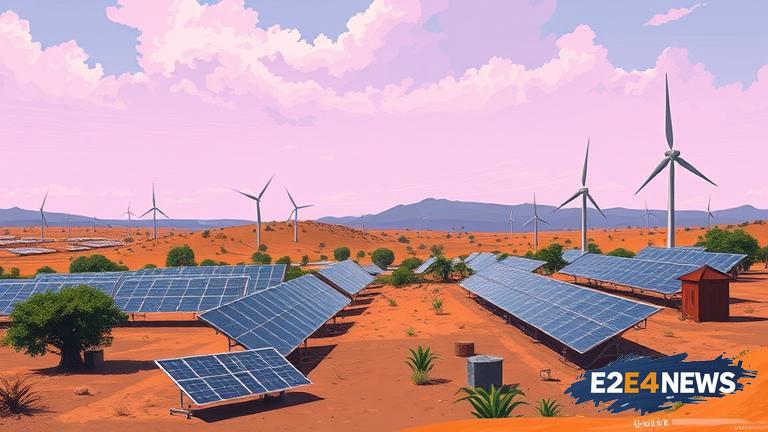The African continent is witnessing a significant shift towards renewable energy, driven by the need to address the pressing issues of energy access, climate change, and sustainable development. With a growing population and increasing economic activities, the demand for energy is on the rise, and renewable energy sources such as solar, wind, and hydroelectric power are becoming increasingly attractive. Many African countries are now investing heavily in renewable energy infrastructure, with a focus on decentralized energy systems that can provide energy access to remote and off-grid communities. This trend is not only reducing the continent’s dependence on fossil fuels but also creating new economic opportunities and jobs in the renewable energy sector. According to recent reports, Africa has the potential to generate over 1,000 gigawatts of renewable energy, which is more than twice the current installed capacity. The African Union’s Agenda 2063 has set ambitious targets for renewable energy, aiming to increase the share of renewable energy in the continent’s energy mix to at least 50% by 2030. Several countries, including South Africa, Morocco, and Egypt, are already making significant strides in renewable energy development, with large-scale solar and wind farms being built to meet growing energy demands. The use of renewable energy is not only reducing greenhouse gas emissions but also improving air quality, enhancing energy security, and promoting sustainable development. Moreover, the cost of renewable energy technologies is decreasing, making them more competitive with fossil fuels and increasing their adoption rates. The African Development Bank has also launched several initiatives to support the development of renewable energy in Africa, including the creation of a $500 million fund to support renewable energy projects. Furthermore, international organizations such as the International Renewable Energy Agency (IRENA) and the United Nations Environment Programme (UNEP) are providing technical assistance and capacity-building programs to support the development of renewable energy in Africa. The private sector is also playing a crucial role in the development of renewable energy in Africa, with companies such as Vestas, Siemens Gamesa, and Enel Green Power investing heavily in renewable energy projects across the continent. In addition, community-based renewable energy initiatives are also gaining momentum, with local communities taking ownership of renewable energy projects and benefiting from the economic and social benefits they provide. However, despite the progress made, there are still significant challenges to be addressed, including the lack of infrastructure, limited access to financing, and the need for policy and regulatory frameworks that support the development of renewable energy. To overcome these challenges, African countries will need to work together to create a favorable business environment, develop innovative financing mechanisms, and build the necessary infrastructure to support the growth of renewable energy. The development of renewable energy in Africa also has the potential to create new economic opportunities, including the creation of jobs in the manufacturing and installation of renewable energy technologies. Moreover, the use of renewable energy can also improve energy access, particularly in rural areas, and reduce the burden of energy poverty on households and businesses. In conclusion, the renewable energy revolution in Africa is gaining momentum, driven by the need to address the pressing issues of energy access, climate change, and sustainable development. With the right policies, investments, and international support, Africa can unlock its vast renewable energy potential and create a sustainable energy future for generations to come. The continent’s renewable energy sector is expected to continue growing, with new projects and initiatives being launched regularly. As the demand for energy continues to rise, African countries will need to prioritize the development of renewable energy to meet their growing power demands and reduce their dependence on fossil fuels. The future of renewable energy in Africa looks bright, with the potential to create new economic opportunities, improve energy access, and promote sustainable development. The African continent is well on its way to becoming a leader in the global renewable energy market, and its progress will be closely watched by the international community in the years to come.
